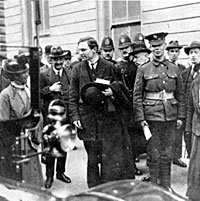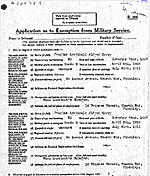|
OBJECTING TO WAR
FIRST CO TO DIE
2 EUROPE GOES TO WAR
3 COUNTDOWN TO CONSCRIPTION
4 FUNDAMENTAL CHANGE IN SOCIETY
5 NO CONSCRIPTION FELLOWSHIP
6 THE SECRET PRESS
7 MANY TRADITIONS
8 THE TRIBUNALS
9 TRANSCRIPS
10 THE 'won't-fight-funks'
11 THE COST OF CONSCIENCE
12 UNWILLING SOLDIERS
13 ALTERNATIVES AND DILEMMAS
14 PRISON
15 THE MEN SENTENCED TO DEATH
16 COERCION FAILS
17 DYCE
18 DARTMOOR
19 THEY WORK IN OVERCOATS
20 THE MEN WHO DIED
21 WINDING DOWN
21 SELECTION OF BOOKS
22 FROM CALL UP TO DISCHARGE
WHY WAR? supplement
|

No Conscription Fellowship council member Charlie Norman being 'fetched' from Court by the military.
"The chairman said the the Germans were doing such bad things that they ought to be stopped by any means. He said, 'What do you think you would do if it was the case that a German officer was molesting your wife and taking her away? And the CO said, 'He couldn't do it Sir.' 'Of course he could.' And the CO said, 'He could not do this.' And they went on like this for two or three times until the CO got the chairman to ask, 'Well, why couldn't he do it? 'An English officer has already done it.'"
Walter Griffin

 |
Lengthy forms to fill in to claim exemption |
|
|
|
10 THE 'won't-fight-funks'
Eva Gore-Booth was an active pre-war suffragette, and one of many supporters of the No Conscription Fellowship. She saw how the Tribunals were destroying the country by sending men to war and so forcing small businesses to close. 'One man particularly,' she recorded, 'was impossible to get out of one's head.’ This working man’s two sons had recently started a small tailoring business. One son had already gone to war. Now the old man had come to the Tribunal to claim exemption for the other. His solicitor explained that if this son had to go to war their business would be forced to close – and the old man and his wife, aged 68, would be left in poverty, ending their days in the workhouse. But the military representative on the Tribunal was unmoved: the young man must serve in the army. ‘The old man,’ Eva Gore-Booth remembered, ‘turned and staggered out of the room.’
The tribunals had little patience for less eloquent applicants. These said hardly a word, mystified and confused as they were by harsh questioning and the speed with which they were called in and sent out. (One survey revealed that out of a sample of 3,701 men who appeared before a Tribunal, 2,870 had received no education after they were 12 years old.)
Not surprisingly, the Tribunals had even less sympathy for conscientious objectors – especially the ones who were exasperatingly argumentative. These men quoted the New Testament: 'Blessed are the meek, for they shall inherit the earth'. They spoke of ‘the brotherhood of man’. They said that war was ugly and irrational. They said a ‘just war’ must fulfil the conditions defined by St. Thomas Aquinas, and that this war did not.
 |
|
Watching from her seat in the gallery, Eva Gore-Booth noticed three types of conscientious objector. First, 'the nervous young man who had no fluency, but whose sincerity broke through the strain of his uneasy manner’. Another was ‘quiet and determined’. Then came ‘the straight-looking young man with the pleasant face’ who knew how to stand up for himself ‘in that rather one-sided debate’. All had two things in common: ‘they were sincere, and they were all dismissed as impostors by the Tribunal.'
When the No Conscription Fellowship saw how badly things were going for the conscientious objectors, they began coaching those still waiting for their Tribunals. They told each applicant he would probably be asked what he would do if a criminal attacked his mother. He must be careful what he said. If he said he would intervene and hit back, then he was obviously soldier material. If he said he would do nothing, he must be a liar. So what was the right answer? It had to be a carefully worded statement about the difference between a soldier and a policeman, between organised violence in war and ‘reasonable force’ in peacetime. No long speeches, and definitely no jokes.
|
